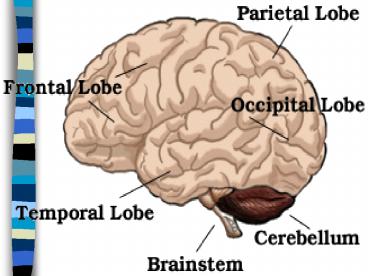Training - PowerPoint PPT Presentation
Title: Training
1
(No Transcript)
2
Intelligence (Chapter 9, p. 324-335)
- Lecture Outline
- History of intelligence
- IQ and normal distributions
- Measurement and Theory
3
Two Views of Intelligence
- Psychophysical
- RT, sensitivity to physical stimuli
- Galton (1883) and later Cattell (1890) proposed
psychophysical tests measured ability - Contribution Psychometrics, measurement of
traits and processes
- Mental judgement
- Memory, vocabulary, and perceptual discrimination
- Binet Simon (1904) diagnosed mental
defectives in Paris - Contribution Testing and IQ
4
(No Transcript)
5
Definition of Intelligence
- An inferred characteristic usually defined as the
ability to profit from experience, acquire
knowledge, think abstractly, act purposely, and
adapt to changes in the environment.
6
What is an Intelligence Quotient?
- IQ (MA / CA) X 100
- MA Mental age, CA Chronological age
- 8 year old with MA of 12 has IQ of 150
- Problem across life span. MA may not differ much
from age 25 to 50, but IQ of someone 50 is not
half that of a 25 year old - Problem with different variability at each age
7
Intelligence tests and IQ
- Goal directed adaptive behavior
- IQ tests define a domain of skills necessary to
succeed in school
What is the environment being adapted to?
What is the goal?
What is the goal?
Original Purpose Identify slow learners and
bring them up to speed
8
(No Transcript)
9
Measuring intelligence
10
Assessing intelligence
- Stanford Binet- Revised
- Short-term memory, Verbal, Quantitative, and
Figural Abstract Reasoning - Wechsler Scales
- Verbal, Performance, and Total IQ scores
- WAIS-III, WISC-III, WPPSI
- Most commonly used intelligence test today
11
Interpretation of performance
- Standardized testing conditions we assume that
temperature, lighting, vision, hearing does not
impact performance - Lack of motivation and performance anxiety can
detract from performance - If you think you will fail or are stressed out,
performance decreases - Mastery, positive stereotypes, confidence
enhances performance - Low motivation interferes with high IQ
- Right answer (psychometric) and strategies used
when solving problems (cognitive)
12
Potential for cultural bias in IQ tests
- What is The Bluenose?
- Who was Thomas Jefferson?
13
Validity Example of SAT
- Face validity Does the test make sense?
- Predictive validity Does it predict Acadia
grades? - Concurrent validity Were they related to Grade
12 grades? - Construct validity Does the SAT measure the
construct it is supposed to measure?
14
Definitions
- Aptitude Ability to learn in a specific area
- Achievement What is already learned in an area
- Psychometric Psychological measurement
- Metacognition Understanding and control of
thought processes
15
Spearmans Model
16
Multiple intelligences? Spatial in athletes,
mechanics Musical genious Emotional intelligence
and empathy
17
Triarchic Theory of Intelligence
Transferring skills to new situations e.g.,
setting up a DVD player
Componential
Experiential
Information-processing strategies,
metacognition e.g., long division
Contextual
Practical applications of intelligence, knowing
when to change, adapt, or fix your
environment e.g., getting to Halifax
18
Normal curve of IQ scores
19
Extremes of intelligence
- Mental Retardation is at low end
- Dx when IQ and adaptive behavior is low
- Mild 50-70
- Moderate 35-55
- Severe 20-40
- Profound lt25
- Gifted at high end
- 1 have IQ gt 135
- Termans longitudinal study documenting success
of men with IQ gt140, but those with low
motivation underachieved - School programming
- Mensa IQ 130 or 98th percentile































